One of the lawyers representing embattled opposition candidate, Ben Exeter in his trial on resisting arrest and assault charges will ask the presiding magistrate, Bertie Pompey, to recuse himself.
The lawyer, Kay Bacchus-Browne, told iWitness News on Wednesday that her request would be “on the ground that the defence is very concerned that we could never get a fair trial, especially after what transpired at the end of the trial on Monday.
“At the end of the trial I made objection that the [assistant] DPP was attempting to get inadmissible evidence in on the record to the effect that there was a breach of the peace. I said it was irrelevant and he overruled me and, to me, was even assisting the DPP how to get in the evidence. And then the most alarming thing happened. I said there was no charge for breach of the peace and he said yes there was a charge for breach of the peace,” Bacchus-Browne said.
“And I was quite alarmed because there was no charge for breach of the peace. And what is more, the magistrate went on and said when Mr. Exeter pushed himself through the police line he was breaching the peace. Now that is giving evidence from the bench, evidence which was not given by the police.
“So, on those grounds, Mr. Exeter can never get a fair trial before that magistrate because it is clear to me that the magistrate, Mr. Pompey, the witness, who was [Assistant Superintendent of Police, Timothy] Hazelwood and the [assistant] DPP all worked together as policemen,” Bacchus-Browne said.
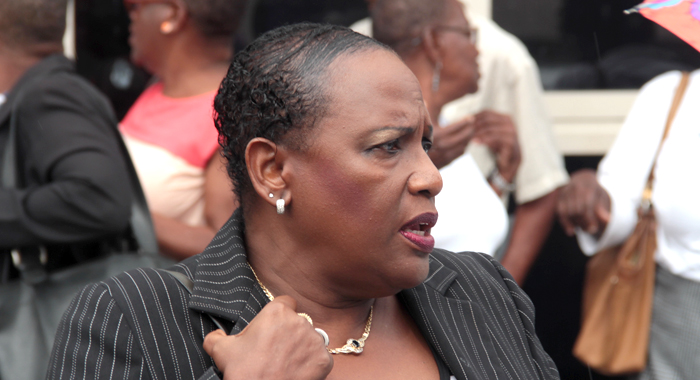
Pompey, a retired Deputy Commissioner of Police, was sworn in as a temporary magistrate some years after his retirement after more than 30 years as a police officer.
Bacchus-Browne further said: “What is more, the only witnesses against my client are police witnesses. Not one civilian they brought. Police witnesses, police magistrate, police prosecutor. Justice must be seen to be done. … after what happened on Monday, I must ask him to recuse himself. Otherwise, I would be shirking my responsibility,” she said.
Exeter, who was the New Democratic Party’s (NDP) candidate for Central Leeward in the December 2015 general elections, was arrested in Kingstown on Dec. 29, 2015, where crowds of NDP and Unity Labour Party supporters had gathered as the ceremonial opening of Parliament was being held.
He is charged that on Dec. 29, 2015 at Kingstown, he assaulted Corporal 632 Morris, acting in due execution of his duty. A second charge is that on the said date and time, he resisted the arrest of Corporal 632 Morris, acting in due execution of his duty.
Exeter is further charged that he assaulted constable Granville De Freitas of Chester Cottage, causing actual bodily harm.
Exeter, who was the holder of a licensed firearm, is also charged with an offence relating to taking a firearm to a public meeting.
Bacchus-Browne’s objection stems from developments in court on Thursday when Hazelwood, who was the office in charge of police operations when Exeter was arrested, was giving his testimony.
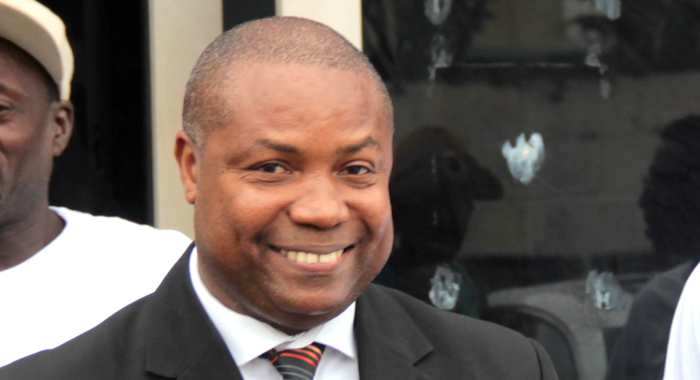
Assistant Director of Public Prosecution, Colin John, who called Hazelwood as a witness, asked the senior police officer what type of offence is “possession of firearm”.
Hazelwood said an indictable offence and John asked what are the police powers of arrest as regards someone suspected of committing an indictable offence.
Hazelwood said the police could arrest them.
The prosecutor then asked what are the police powers of arrest when a person is allegedly committing a breach of the peace.
Bacchus-Browne objected saying there is no charge of breach of the peace and she doesn’t know where that is coming from.
She told the court that it seems like John intended to drag out the case, saying that for the preceding half hour he had been leading evidence that is not relevant.
“There is no charge, your honour, about breaching the peace,” Bacchus-Browne said, to which the magistrate responded that Hazelwood was still giving his evidence-in-chief.
“Your honour, maybe I need to restate my objection. … I said the question is irrelevant to the issue we have here. There is no charge about breaching the peace,” Bacchus-Browne said.
She said if the prosecutor’s question was allowed, the defence could then ask about “every possible charge in cross examination”.
“There is no charge of breaching the peace and therefore that question is irrelevant, immaterial and does not advance the prosecutor’s case in any way.”
John told the court that the evidence from the senior police officer is that Exeter was arrested by the police at the protest because he inferred from those activities that a breach of the peace could have been committed.
“Hence, I do not find the question irrelevant…”
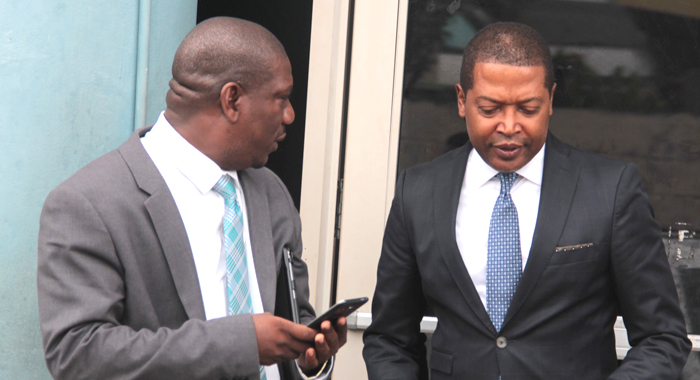
But Israel Bruce, the other defence counsel in the case, told the court that the evidence so far was that Exeter was arrested for the assault of Corporal Morris.
“He has not up to this point in time entered, injected, introduced into his evidence nothing about the breach of the peace,” he said, and accused the prosecutor of conducting “a backdoor operation … to try to bring to the fore that which is not.
“And we cannot allow back door operation. He must ask straight questions and elicit the answer that he wants,” Bruce said, adding that the prosecutor was struggling to get the answers that he wants.
The magistrate said that if counsel’s objection was that the prosecution was leading the witness by bringing in something that was not said, he could agree, but added that the witness is still giving his evidence-in-chief.
Bruce told the court he agrees but said the witness had not entered any evidence about a breach of the peace.
“And my friend is leading that evidence, and I am grounding my objection on that.”
Bacchus-Browne told the magistrate that she does not know where the case is going to end up and she is going further with her objection.
“I am saying that anything about breaching the peace is irrelevant. There is no charge that Ben Exeter was breaching the peace. There is no charge before this court about breaching the peace, and, therefore, the evidence would be irrelevant. What you want to convict him for, a charge that was not laid?”
The magistrate however disagreed with counsel about the charge.
“I do not agree with counsel that there is no charge here that Ben Exeter was not breaching the peace. The fact that he crossed the barrier, that, in itself is a breach of the peace,” the magistrate said.
“Where is the charge?” Bacchus-Browne responded, adding, “Maybe I don’t know. But sorry, Your Honour, please show me the charge about breaching the peace.”
The magistrate responded, saying “There is no charge on it but the fact that the police took action is to prevent a breach of the peace.”
Bacchus-Browne responded firmly: “I am very sorry to hear you say that as the adjudicating magistrate.”
She went on to state that nobody was preventing Exeter from doing anything.
“And so I am very, very disturbed that that is how Your Honour interprets the evidence so far. And now I am even more firm in objecting to that question; even more firm. It is irrelevant. There is no charge about breaching the peace in this court,” Bacchus-Browne told the bench.
But the magistrate said there does not have to be a charge.
“That’s what I am saying. He (Hazelwood) could have brought it in–”
But Bacchus-Browne maintained that the question was irrelevant evidence.
“I would not say it is irrelevant but leading,” the magistrate responded
The magistrate ruled in the prosecution’s favour and John then asked what are the police powers as regards when an offence is committed in their presence.
Bacchus-Browne again objected and the magistrate agreed, saying that it would depend on the type of offence.
But Bacchus-Browne said that it would depend on the type of offence that is related to Exeter’s case.
“We are heading down a road of irrelevant questions, Your Honour,” she said, and reiterated her point that questions must relate to the case.
“Those are basic rules of examination-in-chief, which my learned friend knows. He knows better than that.”
The prosecutor, however, said that if he asked if the police could arrest for assault the defence would object, saying that he is leading the witness.
John went on to ask what was “the physical condition” of Exeter when Hazelwood saw him outside the market.
Hazelwood responded: “Your Honour, Mr. Exeter–” then paused and asked if John meant the way Exeter was behaving or dressed.
John said that the defence was alleging that Exeter was beaten, adding, “I did not want to ask a direct question about him being beaten.”
Bruce, however, stood up and told the court that for the second time in the trial he was going to volunteer to help the prosecution.
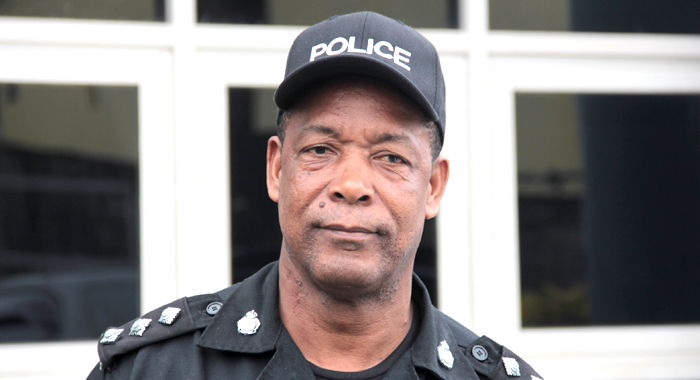
He said John could ask, “What were your observations…?” and suggested that the witness could respond saying he did not notice anything peculiar or that Exeter had a bloodshot eye and swollen face.
John said that all that is part of Exeter’s physical condition.
But Bruce said that what is happening in Exeter’s stomach is also part of his physical condition.
“Can he (the witness) answer that? Point the question to where the evidence [is] you want to extract,” Bruce said.
John then asked, “What did you observe about the physical condition of Mr. Exeter?”
Hazelwood said that based on Exeter’s dress code he could have only seen his face.
“If I say what condition he was in at the time, I would be lying. It was something that happened fast.”
John’s next question was “Did you hit Mr. Exeter?” and Bruce objected, saying that is the epitome of leading.
The magistrate agreed.
“What, if anything, did you do to Mr. Exeter?” John asked.
Hazelwood said he only spoke to Exeter.
“What, if anything, did anybody do to Mr. Exeter in your presence?”
The senior police officer said he did not see anyone do anything to Exeter besides arresting him and taking him to the Central Police Station.
The trial continues June 20.




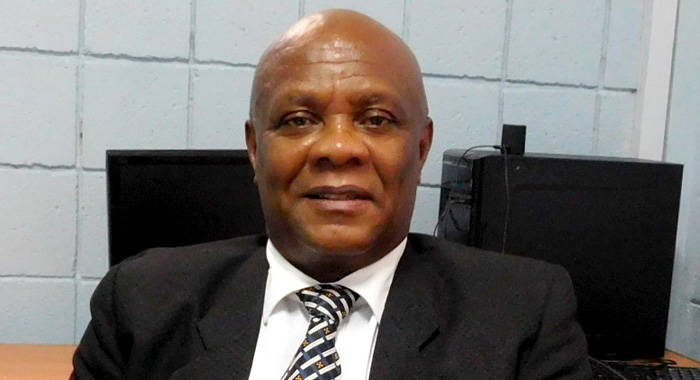


Welcome to the weird and wonderful world of justice Caribbean-style, a perversion of the proud and fair British system we inherited if there ever was one.
And don’t ever forget that the current ruling regime is still hell bent on dumping the last recourse for impartial justice: the law lords of the British Privy Council as shown with its dumping our gracious Queen into the dustbin of history.
Loss of the Privy Council means means corruption rules supreme.
What kind of crappo justice is this in our country? The magistrate is alleging charges that was not brought before the court by the prosecutor? Only in SVG. The magistrate’s job is to listen to the case and evidence presented and make a determination of guilt or innocent based on the statue, not to levy charges that were not brought. That is not his job. The defense is correct in objecting to alleged breach of conduct since the accused was not charged with such. These guys are bent on making our country a police state and anyone who is not of the ULP will have to pay for least of things. Where is the real justice in this country. It appears that one is guilty until proven innocent. I guess the defense will have to get this resolve at the Privy Council, because I really do not see a fair trial here. Putting all politics aside, which is completely impossible in this country, it’s amazing at the kind of nonsense that is going in our country for justice, and the people sit back and take this to mean nothing. Ben is a politician you may say, but you wait until civilians who object to the ULP administration started to be dragged into court on bogus charges in the name of politics. But everything is only for a time! Wow! Different strokes for different folks!
Actually all over the world it is “guilty until proven innocent” when ever an official or wealthier person charges a weaker person. Yes, the ULP has sort of a dictatorship established. Just recently, remember the Courts Registrar? If you belong to the right party you can steal 1/4 million from the people and after the court is finished with you get to keep 10,000 of the take. That is just one big example. I have seen others. If you belong to the wrong party….see what is happening to Exeter!
Lostpet, your direction is right, your numbers are wrong. The juggernaut tief embezzled approximately four hundred thousand dollars. Not a ¼ of a million.
The ol tief did not get to keep 10,000. She had to pay $10,000.
The $10,000 was tantamount to income tax on a profitable business venture. Income tax at a rate of two point five percent. We should be so blessed.
She is, after all, ex-Senator Ronnie Marks of ULP fame wife. What the hell should we expect? Fair?
Wow! It looks like the cronies in the government are going to do anything to destroy Exeter, create charges after the fact, etc… They must really be afraid of him. I suppose if they destroy him in this matter they will be able to win the vote fairly the second time around because they will either destroy Exeter’s credibility, remove him or he will have to be replaced with someone the people do not know or that has a lesser chance of winning.
Wow! What a Country! Looking in from the outside, makes one speechless to see the lawlessness or better words corruption in high places, this sound like one of those of those high profile movies, where Politican are so corrupt that it spills over into the citizen and therefore leaving a society in disarray. Wait a min! It’s not a movie it’s the real deal in SVG. This person should excuse himself indeed, the fact that he was ordain by his God( Dr Salt) and would not give the case a fair hearing, and also because he is trying to help the prosecutor. Nothing last forever people of SVG, let these crooked ppl have their fun.
Remember when two youths were beaten at the police barracks in Kingstown to try and force a confession from them. One was beaten so badly he was in a coma at the hospital for seven days.
The police officers involved were still working and it was difficult to get a case laid against them. Director of Public Prosecution Colin Williams instructed Commissioner of Police Miller to do so. But Miller went on sick leave, leaving his deputy Bertie Pompey to stand in.
Police Keith Miller was slow in acting but the police were charged about one month after Director of Public Prosecution Colin Williams instructed Commissioner of Police Miller to do so, under the reluctant direction of Bertie Pompey
At the time Deputy COP Bertie Pompey said They will be vindicated
Deputy Commissioner of Police Bertie Pompey told The News newspaper that he was confident that the men would be exonerated.
Pompey was at the time filling in for Commissioner of Police Keith Miller who was on sick leave who had not given instructions for the cops to be charged. But when further direction came down from the DPP Pompey had to act like it or not.
Pompey said I am sure, sure they will be vindicated. So there is no need to charge them really. As a matter of fact, they should charge them just for transparency, Pompey told the newspaper.
It would appear that Pompey had already prejudged the case it would seem, and it annoyed Lawyer Jomo Thomas immensely.
Jomo Thomas lawyer for the beaten youths said he thought Pompeys comments were unfortunate. In the first place, the Director Public Prosecutions, except for the Attorney Generals Office, is the highest legal authority in the land. And we thought that there was improper action on the part of the Commissioner for not immediately moving to charge the guys, because I believe that once he was directed to do it, he should have done it.
So as far as I Peter Binose am concerned Pompey is a policeman through and through and will defend another policeman come rain or shine. He was a political appointee in the police force and is now a political appointee in the magisterial section of our judiciary.
I sincerely doubt that the man should be allowed to act in this case or any other case that involves police or politics. He should recluse himself or be asked to recluse himself if he has not got the courage to do so himself.